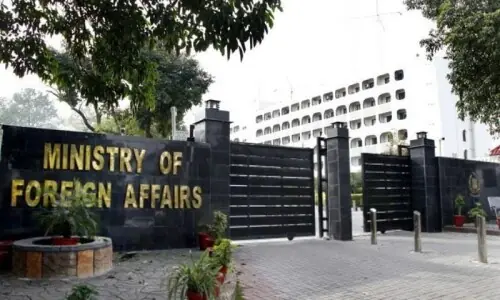
ALL the noise being made by various players jockeying for power in and around the federal capital has not distracted me for a moment from the feat of that remarkable young man who had a split second to make a choice — and look what a choice he made.
Yes, the right decision in this case meant he would be no more. But his training, and the job he did had taught him that selfless service to save the lives of those who had sworn to protect came first, even before his own life. You’d agree it’s easier said than done.
I can’t stop thinking what went through Captain Roohullah Mohmand’s mind in those final moments. The infantry officer had opted to train and serve in a ‘light commando’ (counterterrorism) battalion, and as in Quetta, had earlier led the assault team when Bacha Khan University was attacked in Khyber Pakhtunkhwa.
As Gen Raheel Sharif reaches his final four weeks in office there are calls for him to intervene by frustrated and confused politicians and analysts.
His tale of valour, of ultimate selflessness was narrated by one of the injured Quetta police cadets from his hospital bed to DawnNews. The cadet was in no doubt that he, and many others, lived because of the captain.
Roohullah dived onto the suicide bomber upon finding him hiding under a bed as were the cadets in a dormitory during the Quetta terror attack at the police training centre. He succeeded in smothering the blast — but with his own body, shielding many cadets. Having taken the brunt of the blast, he did not survive.
Talk to any army officer, and now most have battlefield experience given the scope and scale of Pakistan’s war on terror, and they will tell you of dozens, hundreds of such tales of valour and sacrifice.
Young officers also say that the current chief of army staff, Gen Raheel Sharif, is an inspirational leader who has led from the front. This has enabled the army to clear out remote mountain hideouts and large areas where terrorists ruled the roost for years and years.
Another aspect, which is less known, is the general’s empathy with the war wounded and even more so with the families of the many martyrs. He is known to say to them: “Mein aapka dukh samajh sakta hun, mein khud ek shaheed kaa bhai hun.”
Maj Shabbir Sharif, given the country’s highest gallantry award in the 1971 war, was the current army chief’s elder brother. My brother-in-law, who also belonged to the 29th PMA Long Course and died in uniform, used to say that even in the academy course mates saw Shabbir Sharif as an incredibly courageous and dashing officer who would either make it to chief or lay down his life for the country.
Who would be surprised if Gen Raheel Sharif saw his elder brother as a role model and idealised him? Then as a teenager having had to lose a brother like that would not have been easy, but it did instil in him a passion to do the right thing and follow in his brother’s footsteps, to be a soldier’s soldier.
On becoming chief, he must also have realised the burden of his predecessors. This ranged from dabbling in power grabs and politics to acquiring infamy for land development driven by greed. If this was not enough, he made his way to the helm at a time when some of his predecessors’ follies were coming home to roost and posing a threat to national security.
He initiated steps for course correction in many areas. Personally, I strongly disagree with his handling of Balochistan but can’t fault his efforts in Fata or in Karachi for that matter.
There can be no doubt that unlike some of his seniors who were more ‘thinkers’ and often fitted the paralysis by analysis description, the current army chief is a ‘doer’ who took the bull by the horns and inspired his men to offer huge sacrifices in order to establish state writ over utterly lawless parts of the country.
Is more not needed to be done? Definitely, there is a huge unfinished agenda. As recent tensions with the civilian government demonstrated there remains a gap in perception over issues related to militancy as also how best to tackle the phenomenon in its totality in the country.
The government’s shortcoming in certain key areas such as its foot-dragging over the Panama Papers investigation has contributed to tensions, I am sure, with the military, just as the matter has vitiated the political atmosphere with various opposition parties in various states of outrage. The government may have weakened its case for civilian supremacy.
As would be expected every tense cycle in the country’s history is accompanied by a cacophony of voices seeking to derail whatever imperfect system the country has developed. For these people, it is neither convenient nor expedient to remember the absolute disaster the country has faced each time it has tried to embark on an alternative.
As Gen Raheel Sharif reaches his final four weeks in office there are calls for him to intervene by frustrated and confused politicians/analysts, and by those with vested interests. On the other end of the spectrum, one hears, is a government that may feel so desperately challenged that it will ask, in fact insist, that the army chief accept an extension.
The government should know the guarantee for longevity lies in reaching political accommodation with the opposition and on delivering exceptional good governance and not elsewhere. Equally, there might be some around the general asking him to continue, forgetting how Gen Kayani was perceived by the general staff after a similar decision.
The army chief does not have an easy decision to make. Which way will he go? Will he stick to his promised one tenure and no more? The choice is one more year or a place in history. His leadership group is battle-hardened and trained by him to succeed him and take the mission forward.
The soldier’s soldier, by my reckoning, will do the right thing.
The writer is a former editor of Dawn.
Published in Dawn, October 29th, 2016

































